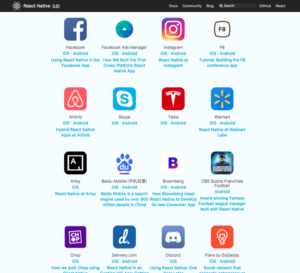
What is React Native? Why Is It Growing In Popularity?
Have you been curious to explore more on React Native since it has opened the door to several opportunities in mobile application development services?
Mobile applications cater to many business activities that further accelerate growth, productivity, and profitability. In the second half of 2022, almost 3.5 million applications will be available on Google Play and 2.2 million on Apple Store.
And for developing native apps, React native development services are becoming a popular choice; as a result, you should understand React Native exceptionally well.
This blog will answer all your queries related to React Native while providing you with insightful pieces of information on it. So, without much delay, let’s discuss what react native is and why several react native app development companies are thriving!
What is React Native?
React Native can be called one of the most sought-after innovations in the background of technological solutions to date. It helps in creating and developing native applications that are cross-platform applicable.
The conventional application method would require the developers to work on different operating systems individually to launch the app on all. Otherwise, the app would function only on limited operating systems that were worked upon.
Also, these applications would have to be worked upon from scratch! All the above-mentioned situations eventually led to extra time and resource usage.
Today, with the help of React Native development, only one developing team is required to develop mobile applications for different platforms at one time.
But where does React Native come from?
React Native is an inspiration from Facebook’s javascript library React. React Native primarily assists in developing mobile applications rather than targeting web apps.
React Native is a formulation of JS (JavaScript) and JSX (XML-Esque markup) and is based on the components of UI.
Similar to Objective‑C and Java, React Native renders elements with APIs using components that are mobile native.
In mobile-web apps, the Ul (User Interface) is optimized on mobile screens with a responsive web design that feels slick. However, React Native has a complete mobile-app-based approach and doesn’t come anywhere in optimizing web applications into mobile screens.
As stated above, you already know React comes from the Java library, but where does Native come from?
As stated, Native Application development refers to app development for specified operating systems. Both Android and iOS, provide developers with tools like UI and SDKs for app development.
However, if the application is to be developed for both platforms, it must be done individually. Here’s when React Native pops up as a solution and helps react native app development across all platforms at once.
Native and Cross-Platform Apps vs. React Native Apps
Let us look at the table below to understand the difference between conventional Native and Cross-platform applications and Modern React Native Applications.
| Native and Cross-Platform Apps | React Native Apps |
| Native Apps are traditional Apps that support many devices today. | React Native Apps are modern applications that run across all platforms. |
| Written in languages like Java for Android, Swift for iOS, and C# for Windows. | React Native uses JS (JavaScript) with similar codes for different platforms. |
| Cross-platform apps get developed on one platform and then get transferred to others. | React Native apps are developed across all platforms using a common language. |
| Cross Platform apps lose compatibility with new system updates. | Because of a single codebase, the application running across multiple platforms does not lose compatibility. |
React Native Performance
The concept of React Native was developed back in 2013 and has now gained an outstanding share of the app market base providing a base for efficient mobile solutions. The technology is still at its infant stage, but react native growing pace is highly considerable.
To make the business model more competent, more and more start-up business owners are choosing to hire React Native development services for their application development requirements.

All the top Applications, like Facebook and Instagram, are products of React Native.
After 2013, React Native was improvised in the year 2017. The improvisations included:
- Cutting-edge list views to avoid inefficient performance
- The new list of structured components for excessive memory usage, along with different row numbers
- React Native playground named Snack as a means to share case studies of issues and demos
While the performance is still subject to significant issues, the overall rating is good, especially for user experience!
7 Reasons Proving the Popularity of React Native:
React Native, an open-source JavaScript framework has become a common choice, and companies are choosing to react native for iOS app development needs.
Community Popularity:
The developer’s community of React Native has become extremely large, carving a popular framework for itself. The users have constantly been trying to identify issues and bugs in the react native platform to improve it continuously. Another significant fact is that the websites that use React are high-profile and have incredible UI UX drawing user attention and paving the way for several mobile app development companies.
Code Reusability
React Native developer can use the code they had written before for cross-platform app development. The same code can be used to develop cross-platform apps without difficulty. This indirectly cuts down on react native development services, maintenance, and deployment time. All of this together means low cost for the react native app development company.
Ease in Debugging
React Native comes with highly efficient Debugging and Error Detection tools. These act as greater advantages for react native developers in spotting and slacking bugs faster. It again helps in reducing the time consumption and app deployment.
Hot Reloading
Hot reloading helps in refreshing the files with made changes. In this context, all the changes the developers make about the UL or application can be implemented while the react native app is running. This offers a better development experience while also enabling the developer’s enhance their productivity.
Third-Party Plugins
Extensibility is the other great advantage of React Native. Third-party plugins are possible for this mobile framework that provides accessibility to those device features that aren’t accessible from Javascript.
The existing plugin library (growing) has everything from reading NFC tags to augmented reality. It allows developers to save time and focus on other areas of work.
Performance and UI
React native works independently from UI, which means the application will keep up with high performance without sacrificing quality. The application implements the hybrid writing method of combining Javascript, HTML, and CSS, an extensively used method.
No Excessive Recompiling
With React Native, the application needn’t get built from scratch. There are numerous readymade components that the developers can readily use.
However, some codes are not available and require building from scratch. Looking at the pace of updates and releases, most of the codes would be soon available.
Why is React Native Popular Among Startups?
More than expanding amongst other sources, React Native has become a popular choice amongst start-ups. Are you wondering how and why? Follow along to understand more and better!
Cross-Platform Solution
Throughout the entire write-up, the point has been indicated and explained. It is advantageous for start-ups because they need not spend extra resources and time on app development.
Also, if they could target only one platform, React Native helps them reach both Android and iOS in the same framework.
A Budgetary Solution
Stat-ups usually have a defined budget that they cannot extend. App development pay is primarily dependent on time and complexity. React Native uses one codebase for developing the app across Android and iOS.
Further, there are in-built solutions available that reduce the complexity levels. Together, it helps cut down costs to a considerable extent.
Requires Less Development Time
Because of reduced complexity levels, the app can be developed much faster when compared to native app development; the solution fits the start-up’s fixed and strict timelines.
Getting late is still acceptable for existing brands, but in the process of building a new brand, such things cannot be overlooked.
Employees Less Developers
Start-ups do not have the bandwidth to employ multiple or giant app development teams. One user can easily take charge of developing the app on React Native. Further, the work can be rendered to a React Native expert firm because of the easy workload.
Changes and Updates are Easy
Start-ups need flexibility with their business’s mobile applications. They are exploring and understanding the market; thus, frequent changes would be real.
This would require them to keep updating information and functionalities as per their understanding. React Native provides third-party logins that make updates very easy.
Pros and Cons of React Native
Lastly, let us look at the pros and cons of React Native to give it the perfect conclusion.
| Pros | Cons |
| Cross-Platform development, i.e. available on Android and iOS, both at once. | UI quality compromise as one codebase works for all. |
| Developer satisfaction is high as it builds an augmented skill set among developers. | It is in its inception phase, and improvements are still to be made. |
| The flexibility it offers leads to a better development process and user satisfaction. | Some Android and iOS features face backup trouble. |
Conclusion
React Native is a developing concept; while it has managed to pull-off many revolutionary changes in mobile app development, there are still many things to work upon. Nothing comes out perfect in one go; thus, with time, React Native shall become much better and more advanced.
From all the information put above, it is clear that React Native has managed to get a much better start for itself. However, there’s more to come!
FAQ’s
Why is React Native the most popular framework for mobile app development?
Many significant factors make React Native for mobile app development so popular. Some of it includes the cross-platform solution, simplified codebase to work on, and extremely easy on time and budget.
What is the difference between native and cross-platform apps?
Native apps are developed for one specific platform, such as Android or iOS. A native application wouldn’t work on both platforms. However, cross-platform applications are available on all operating systems. There are many advantages and disadvantages.
What programming languages are used in React Native?
React Native uses one codebase for Android and iOS, JavaScript, and JSX. It makes the development process much easier.
What are some of the popular apps developed on React Native?
One of the significant reasons why the popularity of React Native has touched the skies is the framework used for apps like Facebook, Instagram, Twitter, and others.
Is React Native expensive?
No! React Native is an inexpensive solution. Because it takes less development time and reduced complexity, the developing charge becomes less.
